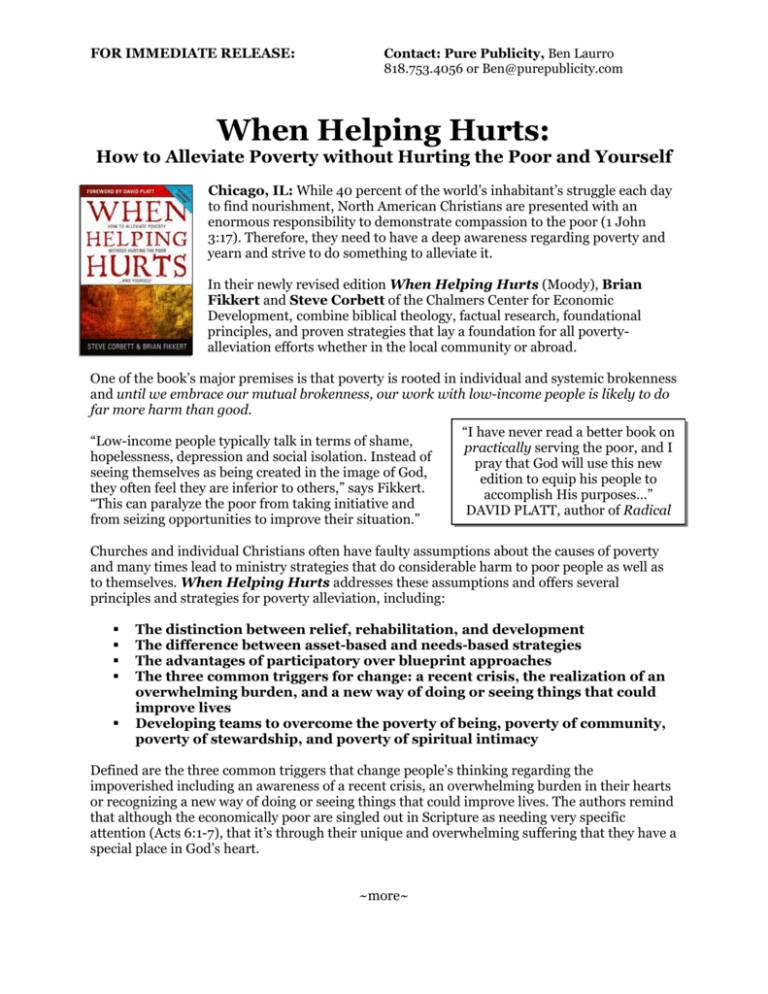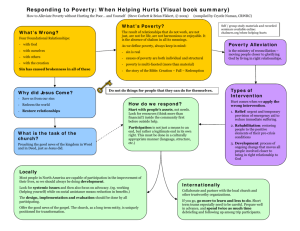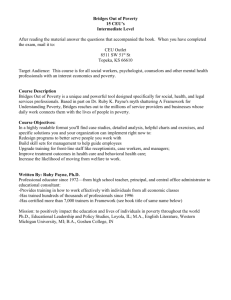When Helping Hurts:
advertisement

FOR IMMEDIATE RELEASE: Contact: Pure Publicity, Ben Laurro 818.753.4056 or Ben@purepublicity.com When Helping Hurts: How to Alleviate Poverty without Hurting the Poor and Yourself Chicago, IL: While 40 percent of the world’s inhabitant’s struggle each day to find nourishment, North American Christians are presented with an enormous responsibility to demonstrate compassion to the poor (1 John 3:17). Therefore, they need to have a deep awareness regarding poverty and yearn and strive to do something to alleviate it. In their newly revised edition When Helping Hurts (Moody), Brian Fikkert and Steve Corbett of the Chalmers Center for Economic Development, combine biblical theology, factual research, foundational principles, and proven strategies that lay a foundation for all povertyalleviation efforts whether in the local community or abroad. One of the book’s major premises is that poverty is rooted in individual and systemic brokenness and until we embrace our mutual brokenness, our work with low-income people is likely to do far more harm than good. “Low-income people typically talk in terms of shame, hopelessness, depression and social isolation. Instead of seeing themselves as being created in the image of God, they often feel they are inferior to others,” says Fikkert. “This can paralyze the poor from taking initiative and from seizing opportunities to improve their situation.” “I have never read a better book on practically serving the poor, and I pray that God will use this new edition to equip his people to accomplish His purposes…” DAVID PLATT, author of Radical Churches and individual Christians often have faulty assumptions about the causes of poverty and many times lead to ministry strategies that do considerable harm to poor people as well as to themselves. When Helping Hurts addresses these assumptions and offers several principles and strategies for poverty alleviation, including: The distinction between relief, rehabilitation, and development The difference between asset-based and needs-based strategies The advantages of participatory over blueprint approaches The three common triggers for change: a recent crisis, the realization of an overwhelming burden, and a new way of doing or seeing things that could improve lives Developing teams to overcome the poverty of being, poverty of community, poverty of stewardship, and poverty of spiritual intimacy Defined are the three common triggers that change people’s thinking regarding the impoverished including an awareness of a recent crisis, an overwhelming burden in their hearts or recognizing a new way of doing or seeing things that could improve lives. The authors remind that although the economically poor are singled out in Scripture as needing very specific attention (Acts 6:1-7), that it’s through their unique and overwhelming suffering that they have a special place in God’s heart. ~more~ FOR IMMEDIATE RELEASE: Contact: Pure Publicity, Ben Laurro 818.753.4056 or Ben@purepublicity.com “Our hope is to restore people to a full expression of humanness, to being what God created us all to be, people who glorify God by living in a right relationship with God, with self, with others, and with the rest of creation,” says Fikkert. When Helping Hurts is intended for those who want to minister to the poor more effectively, including pastors, deacon boards, mercy ministry teams, home and foreign missions committees, missionaries, and donors will all benefit from reading When Helping Hurts. It is also appropriate for an individual or for a group such as a Sunday school class, a ministry team, and a small group Bible study. Additional resources are provided at www.chalmers.org and www.whenhelpinghurts.org. About the Authors: BRIAN FIKKERT is the Founder and Executive Director of the Chalmers Center for Economic Development, a research and training center that is dedicated to helping churches and missionaries to declare the kingdom of God by bringing economic development and spiritual transformation to the poor (www.chalmers.org). Brian also serves as a Professor of Economics and Community Development at Covenant College. Brian received a Ph.D. in Economics with highest honors from Yale University, and a B.A. in Mathematics from Dordt College. Specializing in Economic Development and International Economics, Brian has been a consultant to the World Bank, the Inter-American Development Bank, and the United States Agency for International Development. Prior to coming to Covenant College he was a professor at the University of Maryland and a research fellow at the Center for Institutional Reform and the Informal Sector. Brian and his family live in Chattanooga, Tennessee. STEVE CORBETT is the Community Development Specialist for the Chalmers Center for Economic Development and an Assistant Professor in the Department of Economics and Community Development at Covenant College. Previously, Steve worked for Food for the Hungry International as the Regional Director for Central And South America and as Director of Staff Training. Steve has a B.A. from covenant College and a M.Ed. in Adult Education from the University of Georgia. Product Details: Paperback, 288 pages; Publisher: Moody Publishers; Revised Edition Release Date: April 2012; ISBN-13: 978-0802457066 ### FOR IMMEDIATE RELEASE: Contact: Pure Publicity, Ben Laurro 818.753.4056 or Ben@purepublicity.com Suggested Interview Questions: 1. The first chapter of your book is entitled: “Why Did Jesus Come to Earth?” Why is answering this question so important for working with the poor? 2. How is it possible to hurt the poor (or ourselves) in the process of trying to help them? 3. What is “poverty?” Why does it seem poverty is so overwhelming that it won’t be eradicated? 4. Give examples of harm that you see the church doing in its poverty alleviation efforts? 5. What are some principles that can prevent us from doing harm as we try to help the poor? 6. What are the implications of your perspective for short-term missions work amongst the poor? 7. What are some ways that the church can help the poor economically in North America? 8. What are some ways that the church can help the poor economically in the Global South? (Africa, Asia, and Latin America) 9. Can you share your experience and discoveries from working personally with the poor? 10. What impact does our modern worldview have on alleviating poverty? How do we change our worldview and seek God’s will in helping the impoverished? 11. How can outreach be beneficial to those in poverty who are unwilling to accept help or desire to change their circumstances? 12. What role does repentance have in changing our world? Should repentance come on the part of the Church, outreach organizations or those in poverty? 13. Why the need for a second edition of the book? What’s new? 14. Where can readers find additional resources? FOR IMMEDIATE RELEASE: Contact: Pure Publicity, Ben Laurro 818.753.4056 or Ben@purepublicity.com Notable Quotes from When Helping Hurts: You see, what is at stake is not just the well being of poor people – as important as that is – but rather the very authenticity of the church’s witness to the transforming power of the kingdom of God. (pg. 16) What is the task of the church? We are to embody Jesus Christ by doing what He did and what He continues to do through us: declare – using both words and deeds – that Jesus is the king of kings and the lord of lords who is bringing in a kingdom of righteousness, justice, and peace. And the church needs to do this where Jesus did it, among the blind, the lame, the sick and outcast, and the poor. (pg. 41) But what if this person’s fundamental problem is not having the self-discipline to keep a stable job? Simply giving this person money is treating the symptoms rather than the underlying disease and will enable him to continue with his lack of self-discipline. In this case, the gift of money does more harm than good, and it would be better not to do anything at all than to give this handout. (pg. 53) And now we have come to a very central point; one of the biggest problems in many povertyalleviation efforts is that their design and implementation exacerbates the poverty of being of the economically rich – their god complexes – and the poverty of being of the economically poor – their feelings of inferiority and shame toward the economically poor often communicates that we are superior and they are inferior. (pg. 62) Material poverty alleviation involves the much harder task of empowering people to earn sufficient material things through their own labor, for in so doing we move people closer to being what God created them to be. Work is an act of worship, when people seek to fulfill their callings by glorifying God in their work, praising Him for their gifts and abilities, and seeing both their efforts and its products as an offering to Him, then work is an act of worship to God. (pg. 74) It all goes back to the definition of poverty alleviation. Remember, the goal is to restore people to experiencing humanness in the way that God intended. The crucial thing is to help people to understand their identity as image bearers, to love their neighbors as themselves, to be stewards over God’s creation, and to bring glory to all things. (pg.136) Poor people are empowered to make decisions about the best way to farm, to act upon their decisions, to evaluate the results of their decisions, and then to start the decision-making process all over again. Hence, participation in its fullest sense is not just as a means to an end but the most important end! (pg. 137) Our efforts to help the materially poor are likely to do harm both to them and us. Without such repentance, our efforts to help the poor will continue to be characterized by providing material resourced to the poor, rather than walking with them in humble and relational ways as we call on King Jesus to fix the root causes of both our poverties. (pg. 248) FOR IMMEDIATE RELEASE: Contact: Pure Publicity, Ben Laurro 818.753.4056 or Ben@purepublicity.com David Platt’s Foreword to When Helping Hurts We live in a world of urgent spiritual and physical need. Nearly three billion people are living on less than two dollars a day, and over a billion of them dwell in desperate poverty. They are starving in slums, sold into slavery, orphaned due to AIDS, and dying of preventable diseases. Some of them are our Christian brothers and sisters while others of them have never even heard of Christ. So what are we to do? In light of massive need in the world and in view of God’s merciful concern for the poor, how are we in the church to respond? This question forms the foundation for the pages that lie ahead. Steve Corbett and Brian Fikkert have undertaken a mammoth task in this book, and I praise God for how they have carried it out. They start with the Word of God, which is where we must begin. A book filled with practical thoughts and economic tips would be vain apart from eternal truth. This book is saturated with Scripture as the authors continually ground their assertions in God-breathed authority. They address poverty alleviation through the lens of redemptive history, and in so doing they rightly exalt Christ as the supreme healer of every human heart, whether rich or poor. The authors move from God’s Word to God’s people, specifically the local church. Their conviction (which I share) that the local church has a unique role to play in poverty alleviation affects everything they write. In a real sense, they are writing to the church and for the church; they want to see local churches carry out the commands of Christ in ways that are gracious to the poor, good for God’s people, and glorifying to God’s name. But this book does not stall in the sphere of the theological and theoretical. It moves wonderfully from timeless truth to contemporary application. As you read, you won’t just learn about problems in the world; you will discover how poverty in the world can actually be addressed. In the process of reading case studies, exploring critical questions, and analyzing current events, you will realize that God has given you—and your church—a unique opportunity to be a part of His global plan to make His great mercy known in your community and among all the nations. For all of these reasons (and more), this book is virtually required reading for everyone in our church who is intentionally engaging the poor here and around the world. I cannot recommend it highly enough for anyone who is passionate about spreading and showing the love of Christ to the “least of these.” FOR IMMEDIATE RELEASE: Contact: Pure Publicity, Ben Laurro 818.753.4056 or Ben@purepublicity.com Why We Wrote This Book by co-authors Steve Corbett and Brian Fikkert We have spent most of our adult lives trying to learn how to improve the lives of poor people. About seven years ago our lives converged as we began working together at the Chalmers Center for Economic Development, a research and training initiative that seeks to equip churches around the world to minister to the economic and spiritual needs of low-income people. We also teach together in an undergraduate major in Community Development at Covenant College, a degree program that tries to prepare Christian young people to make a difference in the lives of low-income people in North America and around the world. We still have a lot to learn, as the problems of poverty continue to confound us. Moreover, we do not pretend that the material in this book is unique to us. Rather, the book is simply a way of synthesizing and organizing the ideas of many others into a framework that audiences in a variety of settings have found helpful. We are deeply indebted to the many authors, researchers, and practitioners who have produced a vast range of principles, resources, and tools for us to draw upon. We hope that this book will help—in some small way—to make their ideas and tools more accessible to others. We write this book with a great deal of excitement about the renewed interest in helping lowincome people that is so apparent among North American Christians. While materialism, selfcenteredness, and complacency continue to plague all of us, nobody can deny the upswing in social concern among North American evangelicals in the past two decades. There is perhaps no better illustration of this trend than the exploding short-term mission movement, much of which has focused on ministering to the poor at home and abroad. But our excitement about these developments is seriously tempered by two convictions. First, North American Christians are simply not doing enough. We are the richest people ever to walk the face of the earth. Period. Yet, most of us live as though there is nothing terribly wrong in the world. We attend our kids' soccer games, pursue our careers, and take beach vacations while 40 percent of the world's inhabitants struggle just to eat every day. And in our own backyards, the homeless, those residing in ghettos and a wave of immigrants live in a world outside the economic and social mainstream of North America. We do not necessarily need to feel guilty about our wealth. But we do need to get up every morning with a deep sense that something is terribly wrong with the world and yearn and strive to do something about it. There is simply not enough yearning and striving going on. Second, many observers, including the two of us, believe that when North American Christians do attempt to alleviate poverty, the methods used often do considerable harm to both the materially poor and the materially non-poor. Our concern is not just that these methods are wasting human, spiritual, financial, and organizational resources but that these methods are actually exacerbating the very problems they are trying to solve. Fortunately, there is hope, because God is at work. By renewing our commitment, by adjusting our methods, and by repenting daily, we North American Christians can play a powerful role in alleviating poverty at home and abroad. It is our prayer that God will use the book to play some small role in helping the church of Jesus Christ to increase both the level and the effectiveness of our efforts to minister to a hurting world.








